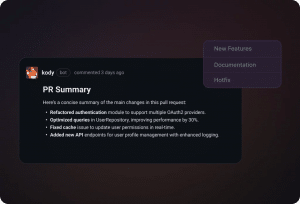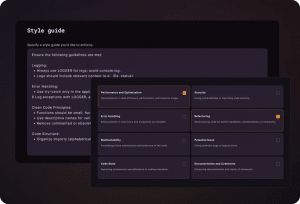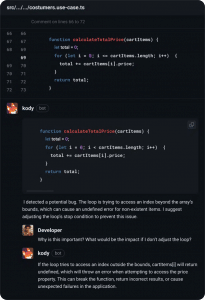Code review is still one of the most important steps to keep software quality high.
But let’s be honest: it often becomes a bottleneck in the development flow.
The pressure to ship fast, combined with growing project complexity, makes the process slow — and sometimes, just frustrating.
AI sped up coding. But it also brought new challenges.
With copilots, it’s easier than ever to write code.
But that also means there’s more code to review — and not always with the same level of quality.
📊 According to GitLab, 47% of devs already use AI to write code.
🔒 But a Stanford study found that this code can be less secure.
In other words: code review is still critical. Maybe more than ever.
What you’ll find here
In this post, I’ll walk you through how to make code reviews more efficient — and less painful — for your team.
We’ll cover:
-
How the review process usually works today
-
The most common problems teams run into
-
And how to improve things with good practices and AI-powered automation
How code review usually works
Here’s the typical flow:
-
A dev finishes a feature
-
Runs some tests and does a quick self-check
-
Opens a PR and picks reviewers
-
Reviewers look at logic, clarity, and team standards
-
A round of comments and fixes goes back and forth
-
Once everyone’s happy, the code gets merged to main
Sounds simple on paper. But in real life…
Where things break down
Even experienced teams run into the usual suspects:
- 🔁 Vague or unhelpful feedback (“maybe rename this?”)
- 🕒 Not enough time to give a proper review
- 🧱 Reviews that take too long and block the flow
- 👀 Superficial reviews that let serious issues slip through
Code Review in Practice — For Authors and Reviewers
It’s a two-way street.
For code review to actually work, both sides need to do their part. Let’s start with the person opening the PR:
Best Practices for Code Authors
Review your own changes before asking for feedback
Sounds basic, but lots of people skip this.
Before opening a PR, read your changes like someone else would.
Ask yourself:
-
Is this clear?
-
Is anything unnecessarily complex?
-
Would I follow this pattern if someone else wrote it?
Just doing this can eliminate a bunch of avoidable comments.
Keep your PRs small and focused
Massive PR? Guaranteed slow (or ignored) review.
The smaller and more focused the change, the faster the feedback.
Bonus: it lowers the risk of conflicts and makes deployment easier.
Write a solid PR description
Don’t make reviewers guess what changed.
Spell it out:
-
What problem you’re solving
-
How you solved it
-
Anything that needs extra attention
Made a tough technical call? Call it out.
Good context makes reviews faster and more useful.
Run your tests first
Nothing kills momentum like reviewing broken code.
Run your tests before opening the PR.
If your change touches something important, make sure it’s properly covered.
That alone gives the team more confidence to approve it.
Be clear about what kind of feedback you need
Need feedback on something specific?
-
A tricky architectural decision?
-
A performance question?
-
A section you’re unsure about?
Say it in the PR. It helps reviewers focus and makes their feedback way more useful.
Best Practices for Reviewers
(Reviewing well also means writing fewer bugs later)
Start with the tests
Before diving into the code, check the tests.
-
Do they cover the critical scenarios?
-
Can you trust that nothing broke?
If the tests are weak or missing, raise that flag early.
Document important decisions
If there’s a meaningful discussion in the PR — architecture, tech choices, scope changes — write it down.
Could be in the PR comments or an internal doc.
This avoids repeating debates later and keeps the team aligned.
Give feedback with context

Skip the “this could be better” type of comment.
If something needs to change, explain why — and suggest a fix if you can.
Context makes reviews more productive and avoids back-and-forth.
Focus when reviewing
Trying to review between meetings or at the end of the day usually leads to two outcomes:
-
You approve without really reading
-
Or you nitpick meaningless stuff
Block off 15–20 minutes. Focus only on the review.
It’s better for you, your team, and your codebase.
Prioritize what actually matters
Not everything deserves a comment.
✅ Yes: logic, clarity, impact, security
❌ No: whitespace, commas, formatting (let the linter handle it)
Don’t waste energy on irrelevant details — focus on what actually impacts the product.
Use checklists to stay consistent
Even experienced devs miss things.
A checklist helps keep reviews consistent.
Build one for your team with key items like:
-
Test coverage
-
Security concerns
-
Team standards
-
Risks and system impact
You’ll find more best practices further down the article.
Why automate code review with AI?
Code review is still one of the biggest bottlenecks in the development flow.
And a lot of that comes from repetitive tasks — checking style, spotting common issues, validating patterns.
Automating this part with AI isn’t just a shortcut.
It’s a practical way to move faster without sacrificing quality.
What AI already does well
AI tools today analyze code based on your team’s standards — and can catch things like:
-
Security issues
-
Style violations
-
Missing tests
-
Recurring patterns that devs often miss
They provide instant feedback, right in the PR.
So by the time a human looks at it, most of the obvious fixes are already done.
The impact in practice
And this isn’t just theory. Studies and real-world reports show how much things have changed:
⏱ Up to 90% faster reviews
Repetitive tasks (style checks, best practices, common bugs) get handled automatically.
That frees up devs to focus on what actually matters — business logic, technical decisions, mentoring.
🐛 Fewer bugs in production
Teams using AI for reviews have seen up to 70% fewer post-deploy bugs.
More issues get caught before they reach users.
🚀 Up to 50% more productivity
Faster feedback loops mean devs spend more time building and less time fixing.
Less waiting. Less rework. More shipping.
How to automate code review with AI
Automation isn’t just about plugging in a tool and calling it done.
To actually work, it starts with two key steps:
1. Start with your team’s standards
Before bringing AI into the process, your team needs to define what “good code” looks like.
-
What style rules are non-negotiable?
-
What best practices should always be followed?
-
How do you handle security, testing, and readability?
Map it out. Write it down.
Automation only works if it knows what to follow.
The clearer your standards, the smarter the AI will seem.
2. Pick the right tool (one that doesn’t get in the way)
Here’s the part where we talk about Kody — our AI code review agent, built to review code like your team would.
Kody plugs directly into your Git setup (GitHub, GitLab, Bitbucket, or Azure DevOps), analyzes your PRs, and suggests improvements based on your team’s standards.
No extra platforms. No friction.
It doesn’t replace human reviewers.
But it takes care of everything that can (and should) be automated — like:
📄 Automatic PR summaries
Kody scans the changes in a PR and generates a clear summary of what was updated.
That way, the team gets the full context in seconds — no need to read every line.
Less guesswork. More speed. And reviewers focused on what actually matters.

✅ Ensures code follows your team’s standards
Kody learns how your team writes, structures, and organizes code.
It makes sure every PR sticks to those standards — from formatting to best practices to architectural decisions.
No generic suggestions. Just reviews tailored to how your team actually works.

🐞 Catches bugs before they become a problem
Kody analyzes the code for patterns that are likely to cause trouble down the line.
It flags risky behavior, fragile logic, and bad practices that would normally slip through a quick review.
All before the code hits production.

🔁 Fits right into your workflow
Kody runs directly inside your GitHub, GitLab, Bitbucket, or Azure DevOps.
It leaves comments and suggestions in real time — no extra logins, no context switching.
Reviews stay where they’ve always been. Just with more context and less friction.
🚀 Automate your code review
If your team is still spending hours on manual reviews, it might be time for a new approach.
With Kody, you automate the repetitive parts of code review and bring more consistency, speed, and quality to your workflow.
Want to see it in action? Sign up at Kodus and try Kody on your own PRs.



